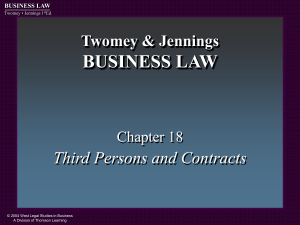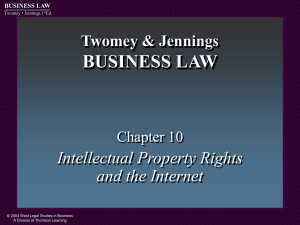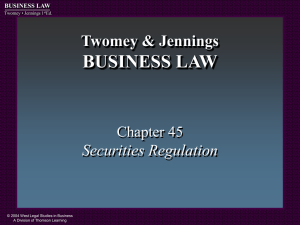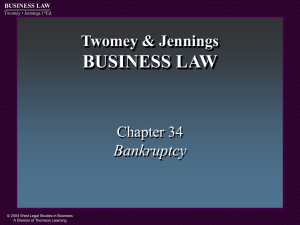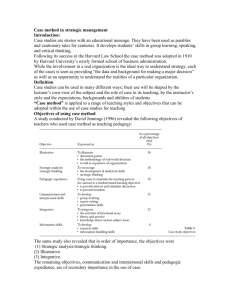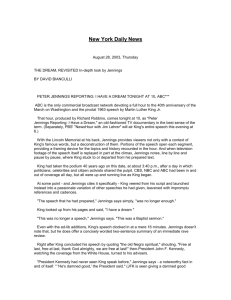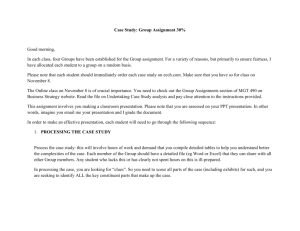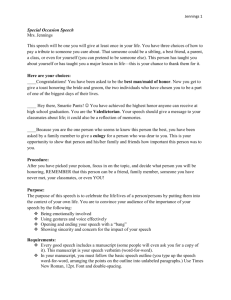Twomey & Jennings BUSINESS LAW
advertisement
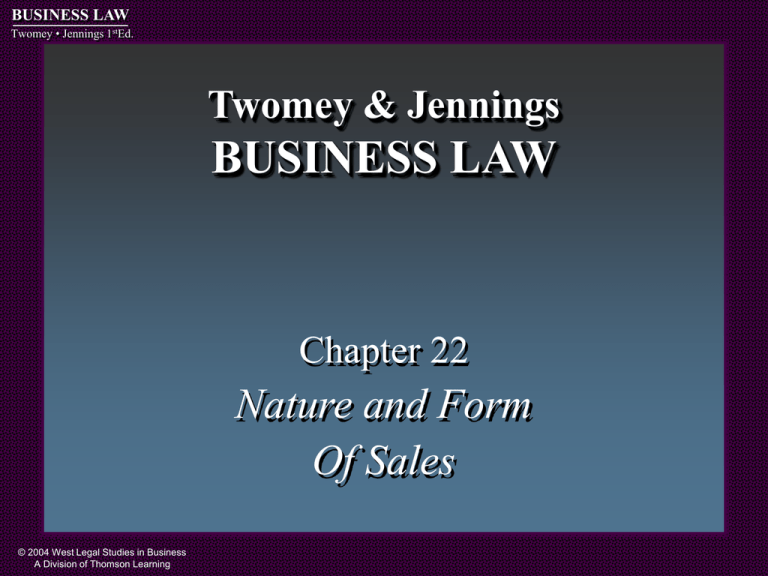
BUSINESS LAW Twomey • Jennings 1stEd. Twomey & Jennings BUSINESS LAW Chapter 22 Nature and Form Of Sales © 2004 West Legal Studies in Business A Division of Thomson Learning BUSINESS LAW Twomey • Jennings 1stEd. Introduction • Contracts for the sale of services and real estate are governed by the common law. • Contracts for the sale of goods (new or used tangible personal property) are governed by Article 2 of the Uniform Commercial Code (UCC). • The UCC does not apply to securities or intellectual property. © 2004 West Legal Studies in Business A Division of Thomson Learning 2 BUSINESS LAW Twomey • Jennings 1stEd. Nature and Legality • A sale of goods is a present transfer of title of tangible personal property for a price. • NOT Sales: – A bailment is a transfer of possession and not title and is therefore not a sale. – A gift is not a sale because there is no price paid. – A contract for services is an ordinary contract and is not governed by the UCC. © 2004 West Legal Studies in Business A Division of Thomson Learning 3 BUSINESS LAW Twomey • Jennings 1stEd. Nature and Legality • A contract consisting of both services and goods is classified according to its dominant element. If a service, then common law governs. If a sale, then UCC 2 governs. Cook v Downing (1995) Does the UCC Apply to Dental Work: Are Dentures a Good or Service? © 2004 West Legal Studies in Business A Division of Thomson Learning 4 BUSINESS LAW Twomey • Jennings 1stEd. Formation of Sales Contracts • Subject matter and quantity are required elements; other terms may be left open as long as the intent to contract is clear. • Requirements on merchants are stricter in some cases. (See later chapters). • A merchant’s firm offer is irrevocable for a reasonable time period. • Acceptance must be in a reasonable manner and time. © 2004 West Legal Studies in Business A Division of Thomson Learning 5 BUSINESS LAW Twomey • Jennings 1stEd. Additional Terms: Battle of the Forms • Between merchants, additional terms become part of the contract, as long as they do not materially change the duties and the other party does not object in a timely manner. United States Surgical Corp. v Orris, Inc. (1998) Did the additional terms become a part of the contract? © 2004 West Legal Studies in Business A Division of Thomson Learning 6 BUSINESS LAW Twomey • Jennings 1stEd. UCC Rules for Additional Terms in Acceptance Nonmerchants Nonmerchant/Merchant Merchants Additional Terms Additional Terms Material Contract without Additional Terms © 2004 West Legal Studies in Business A Division of Thomson Learning Offer Is Limited Objection Contract with Additional Terms 7 BUSINESS LAW Twomey • Jennings 1stEd. Defenses to Formation • The same defenses available to formation under common law are incorporated in Article 2, including illegality. • In addition, the UCC recognizes unconscionability as a defense to formation. © 2004 West Legal Studies in Business A Division of Thomson Learning 8 BUSINESS LAW Twomey • Jennings 1stEd. Open Terms • The UCC does not require every term to be stated for a contract to be valid. • Article 2 provides for missing terms. • Price may be open, stating a formula for how the price would be figured later. • Some open terms are interpreted by past patterns in their course of dealing. • Modifications are binding if they are voluntary. © 2004 West Legal Studies in Business A Division of Thomson Learning 9 BUSINESS LAW Twomey • Jennings 1stEd. Output & Requirements Contracts • In output or requirements contracts, the quantity is not specified, but are valid contracts if entered in good faith. • Output Contracts. – A contract for the entire product produced by a seller in a given time period. • Requirements Contracts. – A contract for the seller to sell whatever quantity the buyer needs. © 2004 West Legal Studies in Business A Division of Thomson Learning 10 BUSINESS LAW Twomey • Jennings 1stEd. Forms of Sales Contract • Statute of frauds provides that a sales contract for $500 or more must be evidenced by a writing. • Confirmation memorandum allows two merchants to be bound after an oral agreement with a memo or letter signed by only one party without objection for ten days. Rosenfeld v Basquiat (1998) Is a CrayonScrawled Contract a Sufficient Writing? © 2004 West Legal Studies in Business A Division of Thomson Learning 11 BUSINESS LAW Twomey • Jennings 1stEd. Exceptions To Writing Requirement • Several exceptions to the UCC statute of frauds exist: – – – – Specially Manufactured Goods for Buyer. Receipt and Acceptance of Goods by Buyer. Full or Partial Payment by Buyer. Admission by Party against whom enforcement is sought. © 2004 West Legal Studies in Business A Division of Thomson Learning 12 BUSINESS LAW Twomey • Jennings 1stEd. Uniform Law for International Sales • Uniform rules for international sales are applicable to contracts for sales between parties in countries that have ratified the United Nations Convention on Contracts for the International Sales of Goods (CISG). • Under the CISG, a contract for the sale of goods need not be in any particular form and can be proven by any means. © 2004 West Legal Studies in Business A Division of Thomson Learning 13 BUSINESS LAW Twomey • Jennings 1stEd. Leases of Goods • Article 2A of the UCC regulates consumer leases, commercial leases, finance leases, nonfinance leases, and subleases of tangible movable goods. • A lease subject to Article 2A must be in writing if the lease payments will total $1,000 or more. • A commercial finance lease is irrevocable. © 2004 West Legal Studies in Business A Division of Thomson Learning 14 BUSINESS LAW Twomey • Jennings 1stEd. Leases of Goods • Warranties. Supplier makes express warranties to Lessor, who in turn passes them to the Lessee. – Financier-Lessor does not make implied warranties. Reeder v Bally’s Total Fitness Corp. (1996) Is the Defendant Liable for Breach of Warranties? © 2004 West Legal Studies in Business A Division of Thomson Learning 15
